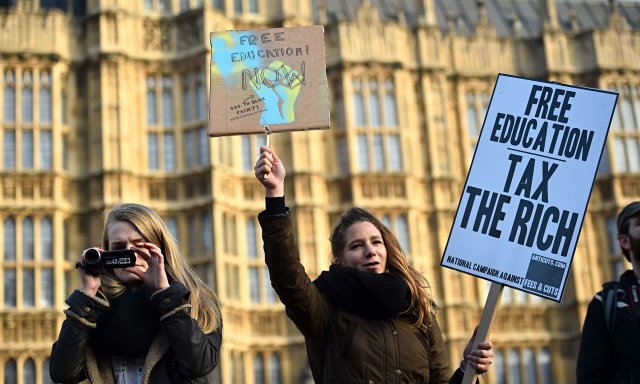
In 2015 Prime Minister Tony Abbott was booted from the top job courtesy of his own party and replaced by Malcolm Turnbull. This was considered a victory by many and a result of the work of a number of social movements campaigning against a range of Abbott's policies.
Under Abbott, the government ineptly pursued an agenda of privatisation and cuts to public services such as education and health. The measures were defeated again and again due to the pressure of grass roots actions around the country. Under Abbott, the Senate rejected university fee deregulation, twice, and the Medicare co-payment.
With Abbott gone, some fell for the illusion that a Turnbull leadership would result in a more moderate Liberal party, one that was progressive socially, if not economically.
However, little has changed in terms of policy. The Coalition is still actively pursuing a political agenda that disproportionately affects working people.
Government attacks
In just the past few weeks, they agreed to a proposal to cut bulk-billing incentives for pathology services. These changes will lead to women being required to pay upwards of $30 for a pap smear and other basic pathology services.
In the past year Turnbull has spoken about the possibility of raising the GST, which would result in an increase in the price of basic goods and services. This is despite a recently released report from the Australian Taxation Office, which found that almost 600 major corporations have paid next to no tax.
The Turnbull government is intent on creating a government surplus, but rather than demand the big end of town pay their fair share of tax, those already struggling face having their services cut while the cost of everything rises.
Recent changes to the start-up scholarships for students receiving AUSTUDY and Youth Allowance are now being replaced with start-up loans for all new university students beginning study in 2016. This will require students to incur further debt to buy books and other equipment for study, on top of the increasing HECS burden.
There is also the possibility that students who receive welfare will be forced on to cashless welfare cards, which would mean that only 20% of their income would be received in cash. This is supposedly part of the government's income management scheme to restrict spending on alcohol and gambling. Instead it will make things even harder for young people wanting to study.
The government, with the support of the Labor, has been testing these cashless welfare cards in Aboriginal communities, with plans to implement it on a national level.
Such a “reform” is guaranteed to increase financial stress for young people. As it is now, according to a 2013 Universities Australia report, two-thirds of university students live below the poverty line.
On the environmental front, the Turnbull government has been no better. No direct action on ending fossil fuel subsidies to coal corporations has been taken, and little to no investment has been made in alternative energy solutions. Turnbull refused to sign an international agreement during the Paris climate talks to phase out fossil fuel subsidies.
Mandatory detention of refugees still persists, with Turnbull himself stating that the government's “tough” immigration policy is the only way to stop asylum-seekers drowning at sea.
Workers' rights continue to be attacked under Turnbull. There is a push to cut weekend penalty rates: Turnbull has stated that “lower penalty rates” are inevitable in the context of a “seven-day economy”. In the past year the government has also conducted a witch hunt against the CFMEU as part of their agenda to attack workers' rights.
Other parties offer no alternative
Based on this track record, we can say with confidence that the Liberal party will continue to attack the poorest and most disadvantaged sectors in society. But what is the alternative?
Labor's policies are almost identical. It supports mandatory detention of asylum seekers and fails to offer a genuine political alternative to the corporate agenda of the Turnbull government.
Recently, we have seen the Greens shift to the right under the leadership of Richard Di Natale, including making deals with the government and appealing to the big end of town that they too can be trusted by big business.
This year another federal election will be held. For young people today, there is no better time to make our voices heard and demand real political change that puts the needs of people before big business and corporations.
Yet creating real lasting political change cannot be based on working within the parliament and the confines of the two-party system. We have to work collectively and more broadly.
This involves campaigning year-round for refugee rights, climate action, the rights of Aboriginal and Torres Strait Islander people, for workers' rights and free university education. The requires attending demonstrations, building grassroots alliances and taking direct action to fight for our rights.
In addition to grassroots activism, Resistance: Young Socialist Alliance will be participating in the upcoming federal election, campaigning with the Socialist Alliance to put forward an alternative to the major parties' neoliberal agenda.
Socialist Alliance will be campaigning for increased taxes on the rich to fund education and public services, for genuine climate action and for the humane treatment of refugees, along with calling for people and activists alike to come together for a political alternative that puts people before profit.
There's no better time to get involved in the struggle for another world than in 2016.
Like the article? Subscribe to Green Left now! You can also like us on Facebook and follow us on Twitter.